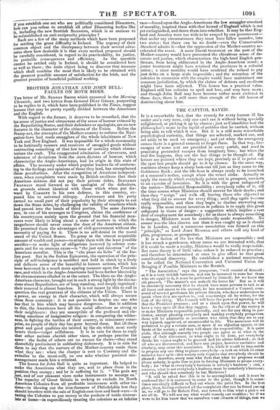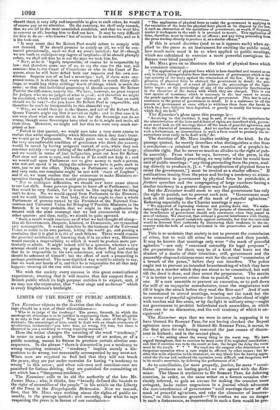THE CAPITOL SAVED.
IT is a remarkable fact, that the remedy for every human ill lies under one's very nose, only one can't see it without being specially enlightened, or picking it up by chance ; just as Calandrino had the philosopher's stone in the lapful of pebbles that he carried, without being able to tell which it was. But it is a still more remarkable psychological curiosity, that things are selected, marked out, and set aside to be used on emergency ; and yet when the emergency comes there is a general consent to forget them. In that way, tire- escapes of some sort are provided in every parish, and used in practising pretended escapes from imaginary fires ; but when the real fire happens, they are the last things to be thought of. Big letters are painted where they are kept, precisely as if to point out the spot lest people should go to it by chance. In the same way, mariners always keep a sharp look-out till just as they conic to the Goldstone Rock ; and the life-boat is always ready to be launched at a moment's notice, except when the vessel sinks. Actually to apply the remedy which everybody points out in prospect, amounts to an exercise of invention. So it is with the great safeguard of the nation—Ministerial Responsibility : everybody talks of it, till the time comes when Ministers should answer for their deeds ; and then they "resign" and walk off, leaving those who objected to what they did to answer for every thing ; until they again become really responsible, and then they begin to decline answering any thing. The most recent invention in politics is to apply this great safeguard in times of danger : a suggestion which implies a vast deal of employment for somebody ; for as there is always something in danger, Ministers must be continually made responsible. No sooner was the idea thrown out than it was caught up as it should be in London, and a numerous association was formed on this "principle," as Lord Jona RUSSELL and others call any kind of plan, programme, or prospectus. It is a fiction of the law that Ministers are responsible ; and it has struck a gentleman, whose name we are intrusted with, that if it could be made a reality, Ministers would be really respcusible. But mere theory is of little value unless it be reduced to practice ; and therefore he determined at once to give effect to that great constitutional discovery. He established a national association, to be called the National Convention and Universal Union for Bringing if Possible Ministers to the Scratch.
" The Association," says the prospectus, "will consist of himself: as it is a very ticklish business, and can be intrusted to none but those who are equal to it, it must be performed by himself; for we know the old proverb, The master's eye maketh the horse fat.' But as it will be absolutely necessary that he should have some persons to talk to at all times and assent to his counsel, he has nominated a Council, com- posed of several gentlemen his private friends, who have undertaken to speak when they are spoken to, and countersign all he writes, for the look of the thing. The Council will have the power of agreeing to all that the President proposes ; and as a check upon that power, be will have a veto upon all that they suggest. As the object of the society is to make Ministers responsible generally, and not for any thing in par- ticular, except pleasing everybody and making everybody prosperous, those will be admissible as associates who think that they are in any way injured, aggrieved, or unsuccessful in life. The associates will be permitted to pay a certain sum, or more if no objection appear, to the funds of the society ; and they will share the responsibility. It is quite plain, that although scarcely two people can agree as to what is the cause of their discontent, or what ought to be done, yet every body thinks his wishes ought to be granted and his advice followed ; so that all who are discontented, and have any project, however exclusive and crochety, may enter this association. For, while it would be impossible to propose any one thing to please everybody—a rock on which all other societies have split—this society only requires that everybody should be pleased : therefore, every man who feels that what he proposes would please nobody, is quite free to join in forcing Ministers to please every- body ; for what is everybody's business is nobody's business '; and, e converso, what is not everybody's business must be somebody's business; and who should that somebody be but Ministers ? "It will be asked how this is to be accomplished : and it must be confessed that it is necessary to come to the point, though it is some- times amazingly difficult to find out where the point lies. In the first place, then, having collected all the complaints that can be found among us, we will go to Sir Robert Peel, and remark to him what a pickle we are all in. We will not say what would remedy our troubles; for if we were to let him know that we ourselves want all sorts of things, that we
should think it very silly and impossible to give to each other, he would of course pay us no attention. On the contrary, we shall only remark, that we are all in the most unsatisfied condition, and that we want him to content us all ; leaving him to find out how. It may be very difficult for him to do so—who knows ? but of course he is answerable, and so it is his look-out.
"h may occur that Sir Robert Peel would refuse to comply with our demand. If he should promise to satisfy us all, we will be con- tented provisionally, until we find we aren't satisfied ; but if—though we are loath to anticipate any degree of turpitude—if he should plumply i refuse, we shall tell him he s not the man we took him for.
" Now, as he is legally responsible,' of course he is responsible by law ; and therefore some one of us, to try the case for the rest, will summon him to the Court of Conscience or else in the Court of Re- quests, since he will have defied both our requests and his own con- science. Suppose one of us had a sovereign : well, if there were one- pound notes, it is obvious that every note would be worth thirty shil- lings, or would buy thirty shillings' worth of things, which is much the same; so that that individual possessing 1/. should summon Sir Robert Peel for the difference, namely 10s. We have, however, no great respect for judges, who are no judges of what is good ; and therefore we might be nonsuited, which would not suit our objects at all. What on earth should we do next ?—for you know Sir Robert Peel is responsible, and therefore he can't be irresponsible in this shameful way !
"Why, we would then go to the Queen, and tell of Sir Robert Peel. Queen Victoria might say that it served us right : and in that case it is riot very clear what we could do to her ; for the Sovereign can do no wrong, though some Sovereigns have tried to do it, might and main, all their lives. However, we might tell her that we were very much sur- prised at her.
"Foiled in that quarter we would now take a very stern course to realize that awful responsibility which Ministers thiuk they don't incur: we would go to Parliament. We would point out to that assemblage the very uncomfortable condition of gentlemen who think the country would be saved by having assignats instead of coin, while they can convince nobody—to say nothing of the sufferings of mankind at large ; and we would, in terms of just indignation, point out how Sir Robert Peel does not seem to care, and looks as if he could not help it ; and we would call upon Parliament not to give money to such a person, who will not spend it in trying the schemes we have in pea°, each in turn, just to see the effect. Perhaps, as Parliament is sadly corrupt and very rude, our complaint might be met with roars of laughter '; and if so, we must confess that the endeavour to make Ministers re- sponsible through Parliament would prove nugatory.
"Not to anticipate difficulties, we should now have come almost to our last shift. Some persons propose to leave off at Parliament: but that would be very foolish, for it would be like saying that the thing can't be done. No, we would appeal from Parliament to the Electors; and we would intimate to that body, that they ought to elect a whole Parliament of persons named by the President of the National Con- vention and Universal Union for Bringing if Possible Ministers to the Scratch. It is very probable that we might in this application be treated with the same contempt that we had encountered in every other quarter : and then, really, we should be quite aground. "Such a result would convince us of what we had thought all along— that all Governments, Despotic, Limited, or Democratic, are tyrannical and contemptible. It would therefore be the business of the Universal Union to retire to its own parlour, letting the world go, and passing a resolution that it is glad it is rid of such fellows. There would remain the practical satisfaction of knowing that, if in no other way, Ministers would sustain a responsibility to which it would be profane more par- ticularly to allude. It might indeed still be a question, whether a new attempt should not be made, by going to Sir Robert Peel and stating that he is responsible to his own conscience, and telling him that he should be ashamed of himself: but the effect of such a proceeding is perhaps problematical. The most dignified way would be calmly to say, that we wash our hands of it, and that he is responsible for all that may happen ; treating all the rest with silent contempt."
We wish the society every success in this great constitutional experiment ; trusting that it will receive that fair support from a British public which its high purpose entitles it to expect, and, if we may use the expression, that "clear stage and no favour" which is every Englishman's birthright.

























 Previous page
Previous page